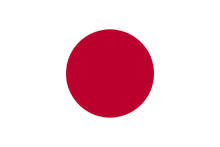Japan (Japanese: 日本, Nihon, "Land of the Rising Sun"; formally 日本国, Nippon-koku, "Nation of Japan") is a country located in Eastern Asia. It is located on several islands east of China, Taiwan, North Korea, and South Korea; and southeast of Russia.
Information[edit | edit source]
- Geographical location: Eastern Asia.
- Climate: Temperate, subtropical and tropical to the south.
- National anthem: Kimigayo.
- Capital: Tokyo.
- Language: No official language, but Japanese is the national language. However, the island of Angaur in the nation of Palau in the far south is the only place in the world where Japanese is actually treated as an official language. Ainu and Ryukyuan are used by the natives in Hokkaido in the north and the islands of Ryukyu in the south, respectively.
- Government: Constitutional monarchy.
- Emperor: Naruhito.
- Prime Minister: Fumio Kishida.
- Currency: Japanese yen.
- National day: February 11.
Japanese language[edit | edit source]
The Japanese language consists of syllables, being either of only a vowel, a consonant followed by a vowel, or a final "n" that sounds like the nasalized "n" in French or Portuguese (or "-ng" for a closer approximation in English).
It is written using four scripts: the curved hiragana (平仮名), the angular katakana (片仮名), the Chinese kanji (漢字) characters, and the romaji (ローマ字) letters of the Latin alphabet.
Here is a guide to help you correctly pronounce the Japanese language, using the commonly-used Hepburn romanization:
Vowels[edit | edit source]
- a - "ah"
- i - "ee"
- u - "ew" or "ooh"
- e - "eh"
- o - "oh"
Diphthongs[edit | edit source]
- aa - longer "ah"
- Japanese Gachimuchi fans sometimes replace any instance of "a" with アッー! Many place names and products from Shinnippori are examples of this tradition, such as a local shop known as Coco StoAAAHre (ココストアッー).
- ii - longer "ee"
- いい男 (ii otoko, "a good [handsome] guy")
- uu - longer "ooh"
- ee, ei - longer "eh"
- oo, ou - longer "oh"
Consonants[edit | edit source]
- k - "k" as in "skip"
- s - "s" as in "soup"
- sh - "sh" as in "sheep", before i or in sh-syllables (si-yV (sha, shu, sho)).
- t - "t" as in "stop"
- chi - "chee" as in "cheer", before i or in ch-syllables (ti-yV (cha, chu, cho)
- ホイホイチャーハン (Hoi, hoi, chaahan, "Hoi, hoi, fried rice")
- tsu - "tsoo" as in "Sun Tzu"
- chi - "chee" as in "cheer", before i or in ch-syllables (ti-yV (cha, chu, cho)
- n - "n" as in "now"
- -n (final n) - something like "ng" as in "sing"
- ん”ん”ん”ん”ん”ん”ん”(肯定) (pronounced as "Ñññññññ (koutei)")
- -n (final n) - something like "ng" as in "sing"
- h - "h" as in "how"
- hi - "hee" as in "here"
- fu - "few" as in "few"
- m - "m" as in "many"
- y - "y" as in "yard"
- r - "ttl" as in "bottle" in some American English dialects
- wa - "wah" was in "want"
- wo is pronounced as "oh", as it currently only functions as a grammatical marker.
- The English letter w is used for "warawara" or "warai" (laughing), the Japanese equivalent of "LOL". It can be repeated so much, that "草" (kusa, "grass") is used instead of a lengthy zigzag of w's.
- g - "g" as in "go"
- z - "dz" as in "adze"
- j - "j" as in "Jeep", before i or in j-syllables (zi-yV/di-yV (ja, ju, jo))
- d - "d" as in "dart"
- b - "b" as in "bet"
- p - "p" as in "park"
Extra notes[edit | edit source]
- When は (ha) and へ (he) are used as grammatical markers, they are pronounced as "wa" and "e" respectively, instead of the usual "ha" and "he".
- Sometimes, ち (chi) is spelled as "ti", hence the spelling "Gatimutic". It allows some users to make puns with the Latin/English latter "T", like "tintin" (chinchin, which means "dick" in Japanese).
Role[edit | edit source]
Japan is the home country of Nico Nico Douga (and Touhou and all), 2channel, and Futaba Channel, and therefore it is also the birthplace of Gachimuchi, which is a popular meme in these websites. The misinterpretations of the dialogue of the actors in the original videos contributed to their popularity.
Due to his fame among Nico Nico Douga users, Billy Herrington sometimes visits Japan and some nearby countries to meet with his fans.
Japan is also the most likely home country of the fictional city of Shinnippori.
Trivia[edit | edit source]
- Japan also has its own forms of fighting sports, known as martial arts. Other than sumo wrestling, it also has aikido, karate, and judo.
- There is an actual city in Japan known as "Obama" (小浜), located north of Kyoto in the west-central part of Honshu island. Its name means "little beach".
- "IKZO" (mentioned in Billy Herrington's Speech) is a nickname for the Japanese singer-songwriter, Ikuzou Yoshi (吉幾三). One of his songs, "I'll Go To Tokyo" (俺ら東京さ行ぐだ, Ora Toukyou sa Igu da), became a popular remixed music video meme in Nico Nico Douga.
- Ikuzou Yoshi was born at Goshogawara-shi, Aomori Prefecture (五所川原市, 青森県), located at northern Honshu near the island of Hokkaido. It is not a small village, but a city.
- "IKZO" also sounds similar to "Iku zo" (行くぞ), which means "Let's go".
- The word "東狂" (toukyou) is used in some Japanese Gachimuchi sources as the neighbourhood for Shinnippori. It is a pun on Tokyo's name, and it means "eastern madness".






